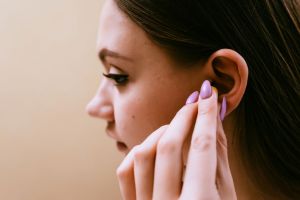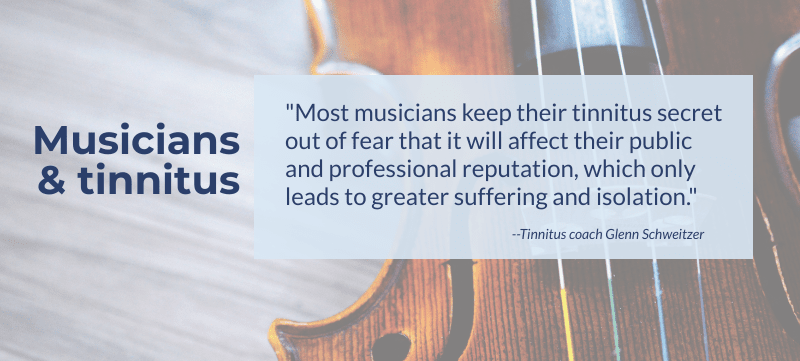If you have ever been to a concert, you might remember hearing a ringing sound in your ears on the drive home. It probably only lasted for a few hours and didn’t bother you very much. But what if it never stopped?
Tinnitus affects roughly 10-15% of the general population, but in some industries, like the music industry, it’s far more prevalent. Many studies show that 40-50% of musicians experience at least some degree of tinnitus.

For anyone who suffers, it’s a challenging health problem—one that can severely impact every aspect of your quality of life. But for musicians, who rely on their ability to hear sounds clearly, tinnitus creates an additional set of challenges that the average (non-musician) tinnitus sufferer doesn’t experience.
Unfortunately, very few musicians actually talk about their tinnitus because they believe that doing so puts their reputation at risk. And so they suffer in isolation, hiding their pain from the world.
If you are a musician (or someone who works in the music industry) suffering from tinnitus, you are not alone–far from it. And even though there is currently no cure, lasting relief is entirely possible. Tinnitus will not keep you from your music.
Tinnitus among musicians: How common?
Published studies vary a bit, but the general consensus is that somewhere between 30 and 50% of musicians have experienced some degree of tinnitus.
This increased prevalence is largely due to higher rates of noise-induced hearing loss amongst people in the music industry. Hearing loss is a common and well documented cause of tinnitus.
The emotional toll of tinnitus on musicians
The emotional and psychological impacts of tinnitus are often much greater for musicians as well, for a variety of reasons.
First and foremost, tinnitus can negatively affect your perception of sound and music, which can feel like an existential threat to your career.
This is further complicated by the fact that musicians already spend a lot of time focusing on tiny differences in sound and frequency. As a result, musicians tend to experience a heightened awareness (or hypervigilance) to sound and hearing, which can directly lead to a more intrusive perception of tinnitus.
For people in the music industry, tinnitus is often the cumulative result of not properly protecting their hearing over time. Many musicians blame themselves and carry strong feelings of remorse and regret for not better protecting themselves.
But most challenging of all is that most musicians keep their tinnitus secret out of fear that it will affect their public and professional reputation, which leads to only greater suffering and isolation. This is especially true for people on the production and engineering side of the music business.
When so few people talk about it, everyone feels alone.
Famous musicians with tinnitus
Though many musicians suffer in secret, some well-known musicians have started to talk more openly and publicly about their struggles with tinnitus in recent years.
One very recent example is Huey Lewis, who had to had to stop touring as a direct result of tinnitus and hearing loss, both of which are symptoms of his recent Meniere’s disease diagnosis.
But Lewis is not alone.
Other famous musicians who openly talk about their tinnitus include:
- Chris Martin (Coldplay)
- Moby
- Ozzy Osborne
- Phil Colins
- Bono (U2)
- Anthony Keidis (The Red Hot Chili Peppers)
- Neil Young
- Eric Clapton (Cream)
- Will.I.Am (The Black Eyed Peas)
- Pete Townshend (The Who)
- Brian Johnson (AC/DC)
- Bob Dylan
- Barbra Streisand
- Thomas Bangalter (Daft Punk)
- Jeff Beck (Yardbirds, Jeff Beck Band)
- Gordon Matthew Thomas Sumner AKA Sting (the Police)
- Eddie Vedder (Pearl Jam)
- Liam Gallagher (Oasis)
- Joey Jordison (Slipknot)
- Grimes
- James Hetfield (Metallica)
- John Densmore (The Doors)
It may seem like a lot, but statistically speaking, if 30-50% of professionals in the music industry experience tinnitus, this list is just the proverbial tip of the iceberg.
One musician’s tinnitus success story
In my work as a tinnitus coach, I’ve had many professional musicians and celebrities as clients, but none of them have ever been willing to publicly talk about their tinnitus.
Despite this, I still always try to encourage everyone to talk about their tinnitus–especially the people who I’ve worked with directly that were successful in finding relief.
You can learn a lot from someone who has suffered greatly but overcome a devastating health problem like tinnitus. And I’ve always found that the public tends to rally around any celebrity who shares their struggles openly and honestly, especially when they are successful in overcoming their adversity.
Fortunately, one of my current tinnitus coaching clients–a talented and successful musician (drummer), composer, producer, and entrepreneur named Scott Schreer – decided to finally share his story.
Scott and I both recently appeared together on a podcast called Blurred Laws and Life, which is hosted by Richard Busch, a prominent and influential lawyer in the music industry.
You may not know Scott’s name, but you’ve probably heard his music. Scott composed the music for the NFL, MLB, Nascar, UFC, as well as many other TV networks, movies and shows. His work has been featured on some of the most iconic advertisements of the last four decades. And more recently, Scott is the founder and CEO of two incredibly successful technology companies: Tunesat and FreePlay Music.
Scott’s story is similar to many others in the music industry. He suffers from very severe tinnitus and kept it a secret for much of his career. But Scott has been working with me one-on-one for the last two months and has made incredible progress in finding relief.
His journey is now a success story, and a powerful one at that. I highly encourage everyone to listen to our podcast episode. It’s a powerful testament to the kind of recovery that is possible through habituation, even when you suffer from severe tinnitus. Click here to listen to Scott Schreer and me on the Blurred Laws and Life podcast.
Protecting your hearing

lower volume without affecting clarity.
Everyone should take steps to protect their hearing in loud environments–not just people in the music industry–because prolonged loud noise exposure doesn’t just cause tinnitus and hearing loss, it makes existing problems worse. Yet very few people seem to take these risks seriously.
At the last concert I attended (pre-COVID), I remember trying and failing to find any other person wearing earplugs. It was incredibly loud–loud enough to damage everyone’s hearing–and I could find no one else protecting themselves. This is largely due to a lack of education on the dangers of loud noise combined with the fact that there is a stigma around wearing earplugs.
Generally speaking, one loud concert without earplugs won’t necessarily cause chronic tinnitus, though it certainly can. The real problem is that many people expose themselves to loud noise for years, often without any noticeable or permanent issues, which leads to a false sense of safety.
The unfortunate truth is that the damage isn’t permanent until all of a sudden it is.
And you just have no way of knowing when that’s going to be.
Preventing the problem from getting worse
As the saying goes, an ounce of prevention is worth a pound of cure. To people in the music industry: Your exposure to loud sound is much greater than average, and if you aren’t protecting your hearing, you need to start now.
At a bare minimum, you should wear disposable earplugs, though it’s worthwhile to invest in either a set of custom musician’s earplugs or custom in-ear monitors.
Musician’s earplugs
Musician’s earplugs are a great option for most people. Rather than trying to absorb or block out as much sound as possible, special attenuation filters are used to reduce the decibel volume level as evenly as possible.
With foam or silicone earplugs, it’s very difficult to hold a conversation, and you can’t hear music clearly. Everything juts ends up sounding muffled. Not so with musician’s earplugs. You can still hear everything clearly, just at a lower volume level.
Many off-the-shelf musician’s earplugs work well, but you can also have a custom molded pair made by an audiologist, which is a far superior option.
You can have a custom molded pair of in-ear monitors made too, so that you can hear yourself and the track clearly as you perform, while also protecting your hearing at the same time.
Hearing aids for music lovers with tinnitus
Many musicians (and music lovers) experience both hearing loss and tinnitus. In the past, hearing aids could help, but weren’t ideal for music listening, as they would often compress the dynamic range to unpleasant levels.
Newer hearing aids are highly customizable and can be programmed to include settings for listening to music. Even better? They can also include customized tinnitus masking programs.
Read more on hearing aids for music lovers and how to cope when you have both tinnitus and hearing loss.
Bottom line: You’re not alone
Musicians may not talk about their tinnitus very often, but the truth is that very few others do either. Tinnitus affects hundreds of millions of people around the world and yet I talk to sufferers every day who had never heard of it before it started.
I also hear from countless people who are suddenly surprised to find that many of their family members and friends also experience tinnitus, once they decide to talk about it themselves.
If more musicians, DJs, stagehands, sound engineers, and producers were open about their tinnitus, they would suddenly find that nearly half of their peers know exactly what they’re going through.
Tinnitus is an incredibly difficult health problem to endure, especially for people in the music business, but it’s not the life sentence that it seems. And while it may distract you from your music in the short term, you do not just have to live with it.
There is always a way forward, and lasting relief is always possible.

